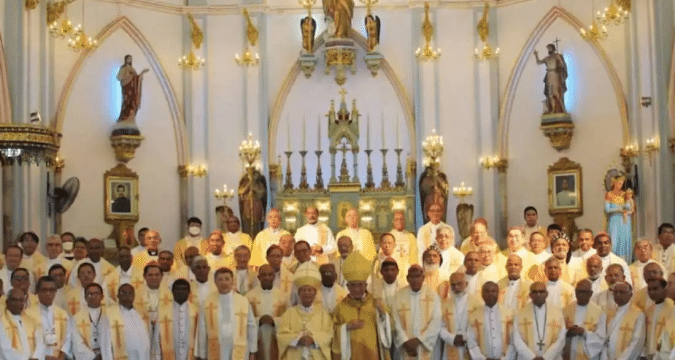
BANGKOK (UCAN): On August 10, Charles Maung Cardinal Bo of Myanmar, the head of the Federation of Asian Bishops’ Conferences [FABC], revoked a four-month-old order suspending the federation’s Manila-based Radio Veritas Asia [RVA] project.
Cardinal Bo’s revocation statement appealed to “all those who are associated with the work of RVA to continue their work with wholehearted commitment.”
Considering “the important mission” of RVA, “it is imperative that we continue to go forward with the work of RVA,” Cardinal Bo said.
The 74-year-old cardinal said in the statement that he originally suspended the project because of “certain circumstances that emerged” that are “now being duly addressed by concerned authorities, a resolution of outstanding issues is in sight.”
The federation suspended Radio Veritas Asia on March 28 following an alleged ownership row with the Catholic Bishops’ Conference of the Philippines [CBCP]. It said “all activities of the project based in the Philippine capital Manila will be suspended” from March 29 because of “deep concerns” arising out of “some kind of disorder and anomaly.”
…it is imperative that we continue to go forward with the work of RVA
Cardinal Bo
The decision stirred up controversy when the CBCP questioned its authority to issue such an order.
Conference president, Bishop Pablo Virgilio David of Kalookan, told said that the suspension “was not backed up by hard evidence, and did not have the approval of the FABC central committee.”
Bishop David said the running of RVA was entrusted to the CBCP in an agreement with the FABC.
He pointed out that for the legal ownership and administration of RVA, “the Philippine bishops created a local corporation—the Philippine Radio Educational and Information Centre, Inc. [PREIC],” under which the radio station has “operated in the Philippines for more than five decades.”
Bishop David noted that “difficulties only began” when the executive secretary of the FABC’s Office for Social Communication [FABC-OSC] “intervened directly in the management” of the station.
Salesian Father George Plathottam, executive secretary of FABC-OSC, insisted that although PREIC is the legal owner, FABC owns the radio project and it has entrusted the commission with the job of running it. He added that the commission made the appointments of the project and decided on its resources, and the PREIC “just signed the papers for their legal validity.”
Bishop David noted that ‘difficulties only began’ when the executive secretary of the FABC’s Office for Social Communication [FABC-OSC] ‘intervened directly in the management” of the station
Father Plathottam countered saying, “Problems started when the Philippine bishops claimed ownership of the project and began to make decisions.” he said adding that despite the suspension “all activities in Manila, the RVA continued” and in effect, Cardinal Bo’s “suspension order was not honoured.”
He said that a five-member body, headed by FABC chairperson Archbishop Tarcisius Isao Kikuchi of Tokyo, has been studying the issues.
However, Bishop David noted that the Philippine bishops are not involved in any ownership dispute.
“It is clear to Philippine bishops that the liquid assets of RVA, and many solid assets, have been acquired through funding agencies for FABC. Other Asian bishops also contributed to RVA,” he said.
Linette Piñon, a lawyer who specialises in corporate disputes pointed out that “under Philippine law, the registered owner of the land has the sole power to administer and manage the property.”
In addition, according to local laws “ownership and management of mass media shall be limited to citizens of the Philippines, or to corporations, cooperatives or associations, wholly owned and managed by such citizens.” Piñon said.
Radio Veritas Asia on air in 1969 but its short-wave radio service was shut down in 2018. Currently it only provides audio-visual content in 22 Asian languages through its website.










